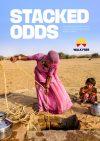Stacked Odds
Women and girls are disproportionally affected by modern slavery.
In fact, women and girls are far more likely to experience forced marriage or forced commercial sexual exploitation.
To coincide with the 2020 International Day of the Girl Child, we have released a report, Stacked Odds, to examine why women and girls are more vulnerable to modern slavery throughout their lifecycle.
Standout findings
Modern slavery is a gendered issue
Although modern slavery affects everyone, there is no escaping the fact that it is a gendered issue. Women and girls are far more likely to experience forced marriage or forced commercial exploitation.
Gender inequality impacts prevalence of modern slavery
Modern slavery is enabled by power imbalances. For women and girls, this imbalance is exacerbated by gender inequality and discrimination, which is embedded in the fabric of our lives – the laws and social norms we live by, and the different expectations imposed on daughters as compared to sons. Countries with a greater gender gap across health, education, and economic status have higher prevalence of modern slavery.
We can even the odds
Gender stacks the odds against girls from before they are born, to the end of their life. This is in our power to change. At its core, the fight against modern slavery is about ensuring people have the most basic of human rights – freedom. This includes the freedom to control your own body, to refuse certain work or to stop working, to decide when and whom to marry. Protecting that freedom, particularly in women and girls, will transform our economies and societies for the better.
Subscribed to Slavery
In collaboration with Leo Burnett, we created a series of powerful, emotive films that subvert popular YouTube formats to highlight the insidious nature of modern slavery – which is often hidden in plain sight.
Call to action
We are also committed to putting our words into action. In light of the findings from the Stacked Odds report, which showed how pervasive gender inequality entrenched in law and culture disproportionately leaves women and girls at risk of modern slavery, we are calling for systemic change.
Together with over 50 organisations who have joined our Call to Action, we are putting pressure on governments to immediately take action to end the vulnerability to modern slavery.
Women and Girls
Women and girls are far more likely to experience forced marriage or forced commercial sexual exploitation.
Modern slavery is driven by power imbalances which, for women and girls, is exacerbated by gender inequality and discrimination.




